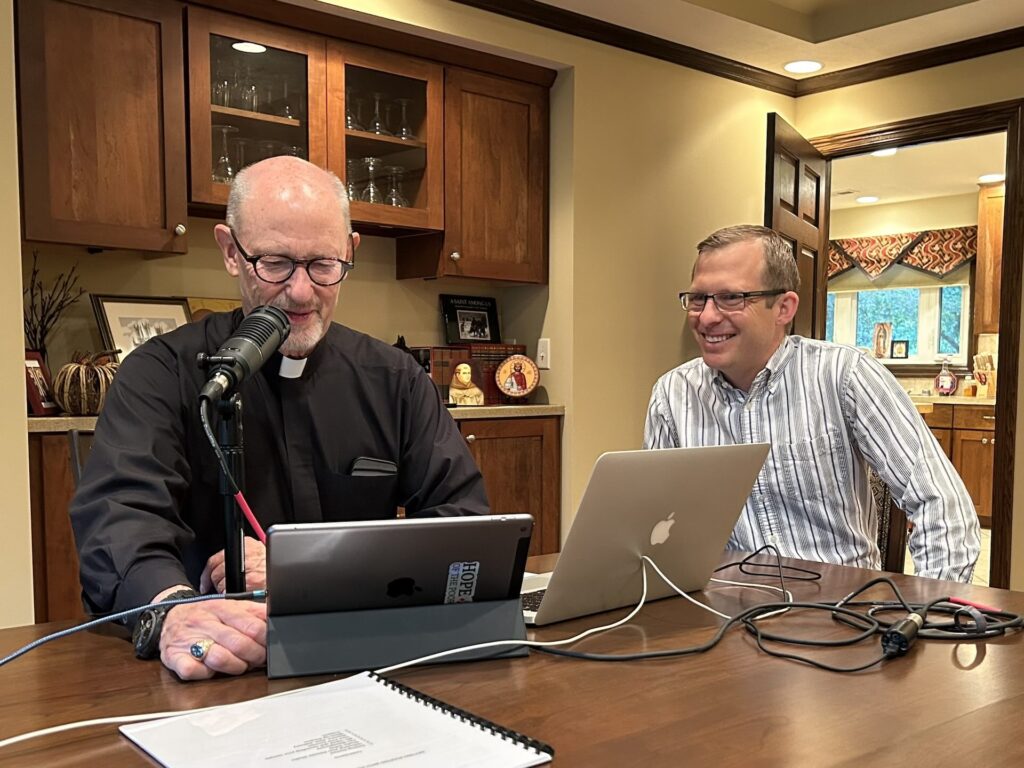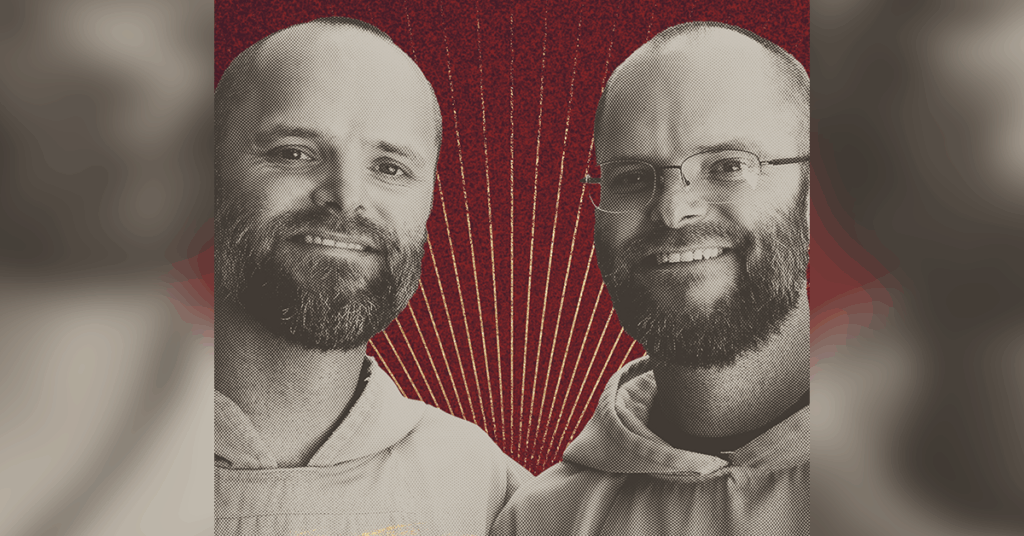“First we fast, then we feast,” as once put by Venerable Fulton J. Sheen, highlighting a common misperception of irony about Exodus men, who on ‘day 91,’ after Exodus 90, then go on to feast with their families and friends — and continue that feast during the 50-day Easter season. Beyond that joyful season, Exodus men are invited to continue feasting on the important days of the Church’s liturgical year.
But aren’t Exodus men anti-fun? Didn’t Exodus 90 make them never want to take hot showers, drink alcohol, or eat sweets ever again? Why would Exodus encourage these men to feast at all after Exodus 90?
If you’re an Exodus man reading this, you may chuckle at the thought of that misperception. The Exodus team even hands out beer koozies and bottle openers at events they host and sponsor, confusing many who think Exodus is all about saying ‘no’ 365 days a year.
“Of course, we pass out koozies!” states the Head of Growth, Nick Meyer. “The mission of Exodus is all about helping men remove modern pharaohs from their lives. Growing in discipline and learning to say ‘no’ to certain habits or pleasures doesn’t make those habits or pleasures inherently evil.”
The Church teaches us about the ebbs and flows of feasting and fasting, noting in the fourth precept of the Catechism, “You shall observe the days of fasting and abstinence established by the Church.” Catechism paragraph 2043 states this observation “ensures the times of ascesis and penance which prepare us for the liturgical feasts and help us acquire mastery over our instincts and freedom of heart.”
The ninety days of Exodus provide men with a sort of ‘operating manual’ to fast — and feast — within the rhythm of the Church’s liturgical calendar.
Origins of Christian Feasting
The concept of Christian feasting comes from the festival days that God gave to Israel in the Old Testament, especially the Passover, Pentecost, and Booths, per Dr. Jared Staudt, the Director of Content for Exodus and author of numerous books, including The Beer Option: Brewing a Catholic Culture, Yesterday & Today.
“Because Jesus established the Mass to be the new Passover, it was understood to be a feast,” he states.
‘Weekdays’ in Latin, he says, are referred to as feria, meaning ‘feast’.
“On the major feasts of Israel, the Israelites were commanded to feast and ensure that the poor could do so, as well. They were days of rest and rejoicing. This was preserved on Sundays and the major feasts of our salvation: Easter, Christmas, and so forth.”
Why Is Feasting Important?
St. John Paul II wrote about the importance of Christian feasting: “God made us for joy. God is joy, and the joy of living reflects the original joy that God felt in creating us.”
“Feasting forces us to slow down,” says Liz Reckart, a working mom in Los Angeles. “With children, it’s so easy to justify scarfing down your food so that you can get to holding a fussy baby, cleaning up some mess, or changing a diaper, so creating a space to celebrate is important so that food becomes more than fuel.”
It’s all about “making the Ordinary, extraordinary,” she says. “The days will pass whether you make them special or not. You can live your life making these feast days the same as any other day, or you can celebrate them the way Heaven does.”
“The point of the Christian life is to live our the glory of God. Fasting grows the heard to receive,
says Fr. Patrick Hake, pastor of St. Peter’s Parish in Fort Wayne, Ind. and an Exodus man. “Feasting fills the heart with that glory.”
So, How Should We Feast?
The three-fold, most basic formula for a proper feast is food, fellowship, and a meaningful intention to celebrate.
If done correctly, feasting is a form of worship — as we aren’t just souls but also flesh. Composites of body and soul; thus, we worship God through both.
“Feasting together helps us satisfy our need for food while feeling a greater connection with our loved ones,” says Jeff Benda, chef and host of the popular YouTube cooking show No Meat Meals. “I’ve witnessed a greater closeness and confidence within my family and friends. We are better at asking for support when we need it, and that connection we get while feasting together helps us understand ourselves better and like each other and ourselves more.”
“It’s really as easy as just being present,” says Scott Murphy, an Exodus man from Littleton, Colo.
When it comes to feasting on Sundays, in particular, Bryan Cain from Louisville, Ky., adds: “Start by making it a day of rest whether you’ve got your work done for the week or not, no work on Sundays.
“It only took a few weeks for our family to form the habit of no work on Sundays, and it has been an enormous blessing we’ve been able to sustain for several years. It leads to a happier week.”
How far is too far?
There is feasting, but then there is binge-ing. The difference between the two can sometimes seem gray — especially after 90 days of Exodus.
“Binge-ing is rooted in distrust and self-reliance,” states Jake Khym, the executive director of Life Restoration Ministries. “Feasting is rooted in trust and security.
“So much of this comes down to the honest desire and intention of our heart,” he adds. “If I am trying to fill an empty hole in my heart or manage my distress that I don’t trust can be taken care of by authentic love, then I’m likely to try to satisfy myself. This self-reliance can often be the root of binge-ing. Feast isn’t about self-reliance; it’s about celebration for and with others that have trust and security as a foundation.”
The beauty of Exodus 90 goes beyond the fasting a man endures during the ninety days — but more towards his relationship with the disciplines: why they’re there and what they mean to his everyday life after day 91.
Men who fast and pray during the ninety days have a deeper understanding (and appreciation) of what it means to have a genuine Christian feast.
Without fasting, as Fulton Sheen reminded us, one cannot truly enjoy the gift of the Christian feast. Cheers, brothers!





